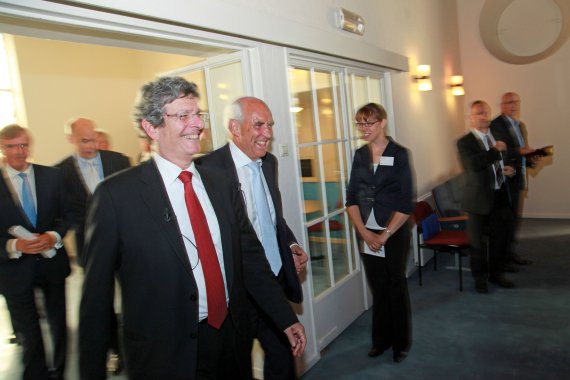It was no surprise, really. Anyone who had seen a newspaper or website on Monday knew what the Wageningen board chair Aalt Dijkhuizen was going to say. After all, his words has already kicked up enough dust (link to Dutch newspaper) before he had even spoken them: intensive livestock farming is necessary to meet the global challenge posed by food shortages and climate change. And, as he added in the Dutch daily paper Trouw, the Netherlands plays a leading role in this process and stands to gain a lot from it. ‘The whole world will look like the Netherlands soon’, he said in Trouw, adding jokingly: ‘We are the Usain Bolt of the food sector.’ Dijkhuizen did not permit himself such frivolity during the opening of the academic year on Monday. Instead, he made a gesture towards the critics. Addressing his academic colleagues, he emphasized that research and discussion should form the basis of any policy. ‘Let us join forces to find the right way ahead together’, was the drift of his appeal, and he believes Wageningen can play a valuable role, with its combination of applied and fundamental research.
‘Science is game-changing’
Dijkhuizen received resounding support for this last statement from the most eminent guest of the day, prominent American scientist Ellis Rubinstein, who has earned his stripes at Science and is now chair of the New York Academy of Sciences. Rubinstein drew the audience’s attention to the scale and complexity of the world food problem, which forms one of the major challenges of our time. Almost one billion people are undernourished, six million children die of hunger every year, said Rubinstein. At the same time, 1.4 billion people suffer from obesity, which besides being a painful paradox is a massive problem in itself. Nevertheless, he is optimistic. History shows, he believes, that science and technology have proven capable of producing ‘game-changing’ developments. According to Rubinstein, Wageningen is already playing a key role as one of the leading ‘brain trusts’ on the cutting edge between food, sustainable agriculture and climate. The typical Wageningen quality that raises so many questions in the Netherlands, is precisely a key success factor, says Rubinstein: ‘Looking beyond pure knowledge for knowledge’s sake, Wageningen enters into interesting alliances with the business world which have the potential to make the world a better place for an affordable price.’
VHL
The other speakers at the opening ceremony, Loek Hermans and Martin Scholten, could hardly compete with these rousing words, of course. As chair of Greenport Holland, Hermans made a plea on behalf of the horticulture sector, while Martin Scholten, director of Wageningen UR Livestock Research, gave the audience a whistle-stop tour of the developments in his field. Education was the missing link at this opening of what is, after, the start of a higher education year. The only education-related topic to be raised briefly was the growth in student numbers. The subject of VHL got short shrift too. ‘This is the last academic year opening in which VHL is part of the Wageningen family’, said Dijkhuizen at the opening. ‘We regret this development, but we have decided to undo the merger.’

